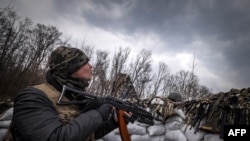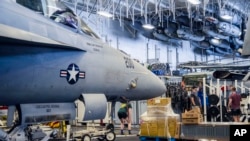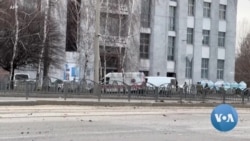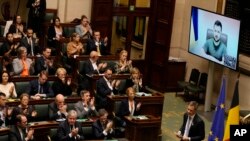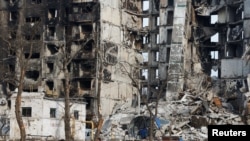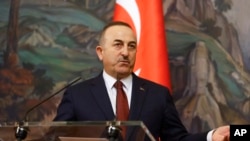Ukraine’s president said in his nightly address Thursday that he has stripped two top generals of their rank.
Volodymyr Zelenskyy called the generals “antiheroes.” One of the generals had been the chief of internal security at the country’s main intelligence agency, while the other had been the intelligence agency’s chief in the Kherson region.
The Ukrainian leader said he did “not have time to deal with all the traitors, but gradually they will all be punished.”
Ukraine officials say Russian forces confiscated 14 tons of humanitarian aid contained in a convoy of 12 buses Thursday in southern Ukraine. The aid included medicine and food.
Another convoy of 45 buses, sent to evacuate civilians from the besieged port city of Mariupol, was stopped by Russian forces Thursday before it could reach its destination. It was not immediately clear when or whether the convoy would be allowed to continue.
One day after Ukrainian officials said Russia had violated its promise to scale back military operations on the outskirts of the Ukrainian capital, Kyiv, the U.S. and its Western allies met Russia's assertions with continued skepticism.
Britain’s military intelligence division warned early Thursday that a majority of Russia’s forces near Kyiv were holding in place “despite the withdrawal of a limited number of units.”
“Heavy fighting will likely take place in the suburbs of the city in coming days,” Air Vice Marshal Mick Smeath, the British defense attaché, said in a statement.
A senior U.S. defense official described the Russian movements as “minor,” warning that Russian forces continue to target Kyiv and other northern cities with airstrikes and artillery.
“It has not been wholesale by any means, nor has it been rapid,” Pentagon press secretary John Kirby said later Thursday, noting less than 20% of the Russian forces arrayed against Kyiv and Chernihiv had been moved.
“It's not exactly clear … where they're going to go, for how long, and for what purpose,” Kirby said. “But we do not see any indication that they're going to be sent home.”
U.S. defense officials believe most of the repositioned Russian forces are likely headed to Belarus for supplies and maintenance before heading back into Ukraine, possibly to help Russian forces fighting in the eastern part of the country.
However, even there, U.S. officials assess, Russia’s military has been stymied.
“As for actual progress, pinching it off or sealing it off and fixing Ukrainian armed forces [in the Donbas], they have been frustrated and not successful,” a senior U.S. defense official told reporters, speaking on the condition of anonymity in order to discuss intelligence.
Russia has put more effort into the Donbas, the official added, warning that “it could mean that this could be a lengthy, more drawn-out conflict.”
The Pentagon said Thursday that Defense Secretary Lloyd Austin approved extending the deployment of the aircraft carrier USS Harry S. Truman to the Mediterranean because of the fighting in Ukraine. The Pentagon also said Austin would keep troops with the 82nd Airborne Division in Poland for "a while longer."
President Joe Biden said Thursday that it appeared his Russian counterpart was charging ahead with his invasion of Ukraine as international aid organizations scrambled to get civilians out of the besieged port city of Mariupol — a city Ukraine’s president described Thursday as “the most horrific place in Europe.”
“The idea that he is pulling all the troops from around Kyiv and moving south, there's no evidence he's done that,” Biden said.
Biden also addressed reports that President Vladimir Putin is growing increasingly isolated.
“There's a lot of speculation, but he seems to be — I'm not saying this with certainty — he seems to be self-isolating,” Biden said. “And there's some indication that he has fired or put under house arrest some of his advisers.”
On Thursday, Biden ordered yet more sanctions on the Russian technology sector. He also authorized the largest-ever release from the strategic petroleum reserve, announcing the release of 1 million barrels a day for six months — a move aimed at lowering domestic oil prices as the sanctions on Russian oil and gas have sent prices skyrocketing globally.
This is the third time Biden has ordered releases from the strategic reserve. The first two did not cause a meaningful decline in prices in global oil markets.
Ukrainian President Volodymyr Zelenskyy said Thursday that his nation’s volunteer army — comprising civilians as old as 60 — has surprised critics by repelling Russia’s advance.
“Did many people expect that our state and our people would be able to resist Russian troops for so long?” he asked in an address to Belgium’s parliament.
But, he said, the conflict has taken a massive toll, especially in Mariupol, where he estimates that 90% of buildings have been destroyed by Russian bombing.
“Today it is the most horrific place in Europe,” he said. “It is hell. It is a catastrophe that everyone knows about, the whole world. But no one is determined enough to help stop the catastrophe in this city and in other cities in our country.”
Fleeing Mariupol
Teams from the International Committee of the Red Cross on Thursday said they were poised to “facilitate the safe passage of civilians” from the strategic Sea of Azov port city after a local temporary cease-fire agreement was reached.
“For logistics and security reasons, we’ll be ready to lead the safe passage operation tomorrow, Friday, provided all the parties agree to the exact terms, including the route, the start time and the duration,” the ICRC said in a statement.
Ukrainian Deputy Prime Minister Iryna Vereshchuk said Thursday that several dozen Ukrainian buses would transport civilians from the besieged city after Russia's military had agreed to a cease-fire from Mariupol to the Ukrainian-held city of Zaporizhzhia beginning Friday morning.
Vereshchuk said Wednesday that the two sides had agreed to open three evacuation corridors and that one corridor would be used for the evacuation of Mariupol and delivery of humanitarian aid to Berdyansk, about 85 kilometers southwest of Mariupol.
Similar evacuation plans collapsed over accusations of fighting along the corridor to Mariupol, where tens of thousands of people have been trapped for weeks without food, water and heat while under attack.
“It’s desperately important that this operation takes place,” the ICRC said. “The lives of tens of thousands of people in Mariupol depend on it.”
Peace talks
On the diplomatic front, Turkey's top diplomat, Mevlut Cavusoglu, said in a televised interview Thursday that Turkey is working to bring the two sides back to the bargaining table.
The head of the Ukrainian delegation, David Arakhamia, said Thursday that talks would resume Friday by videoconference.
Russia said Wednesday that there was no sign of a breakthrough in in-person peace talks with Ukraine hosted earlier this week by Turkey in Istanbul.
Sanctions
Russia on Thursday said it would expand the list of European Union officials prohibited from entering the country in response to a broad range of Western sanctions that continue to be imposed on Russia after its February 24 invasion of Ukraine.
The travel ban applies to the EU’s “top leadership,” which includes “a number of European Union commissioners and heads of EU military structures” and the “vast majority” of parliamentary members, Russia’s Foreign Ministry said in a statement Thursday. Other public officials and “media workers who are personally responsible for promoting illegal anti-Russian sanctions” were also targeted.
Also Thursday, the U.S. Treasury Department announced in a statement that it had sanctioned Russian technology companies and illegal procurement operations the Kremlin is leveraging to circumvent existing sanctions that are crippling Russia’s economy.
Britain added three companies to its list of Russia-related sanctions, its Finance Ministry announced Thursday. The ministry did not immediately provide details about why Photon Pro LLP, Majory LLP and Djeco Group LP, all registered with British addresses, were sanctioned.
The U.S. Treasury Department said, however, the three firms were “front companies” that have been used to facilitate procurement of vital equipment for the Russian government.
VOA National Security Correspondent Jeff Seldin, Pentagon Correspondent Carla Babb, United Nations Correspondent Margaret Besheer and White House Correspondent Anita Powell contributed to this report.




